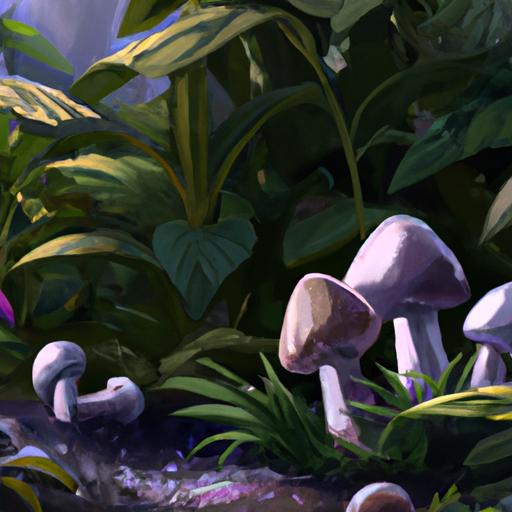Do button mushrooms have B12? It’s a question that’s been hotly debated in the health community for years, but now we have the answer.
From understanding what button mushrooms are and what B12 is, to learning about the health benefits of eating button mushrooms and how to maximize B12 intake, this article will provide you with all the information you need to make an informed decision about adding button mushrooms to your diet.
So, if you want to know the answer to this age-old question, read on!
Table of Contents
Short Answer
No, button mushrooms do not contain any Vitamin B12.
While some mushrooms have small amounts, it is not enough to provide any significant amounts of the vitamin.
Vitamin B12 is only found in foods of animal origin, such as meat, fish, eggs, and dairy products.
Therefore, if someone is on a vegan or vegetarian diet, they will need to supplement their Vitamin B12 intake.
What are Button Mushrooms?
Button mushrooms, also known as white mushrooms, are common edible fungi that are cultivated and harvested around the world.
They are typically sold in grocery stores and supermarkets in their immature form, when their caps are still closed.
These mushrooms are usually white or pale brown in color and have a firm texture and a mild, earthy flavor.
Button mushrooms are often used as a topping for pizzas, in soups and stews, and as a side dish.
Button mushrooms are a good source of essential nutrients, such as protein, fiber, vitamin D, vitamin B2 (riboflavin), potassium, and selenium.
They are also low in calories and fat, making them a healthy addition to any meal.
But what about vitamin B12? Do button mushrooms contain this important nutrient?
What is Vitamin B12?

Vitamin B12 is an essential nutrient that plays an important role in maintaining good health.
It is found in a variety of foods, including red meat, fish, eggs, dairy, and some fortified cereals and breads.
It helps the body to use carbohydrates, fats, and proteins for energy, and it plays a critical role in the formation of red blood cells and in the proper functioning of the nervous system.
Without enough vitamin B12, an individual may experience fatigue, anemia, and neurological problems.
In addition to its role in the body, vitamin B12 is also a crucial part of the metabolic process.
It helps to break down glucose, which provides energy for the body, and it is essential for the production of healthy cells.
It is also necessary for DNA synthesis and for the proper functioning of the immune system.
For these reasons, it is important to get enough vitamin B12 in your diet.
While red meat, fish, and eggs are all excellent sources of vitamin B12, some people may not be able to consume these foods due to dietary restrictions or allergies.
For these individuals, button mushrooms may be a good alternative source of vitamin B12.
Do Button Mushrooms Contain B12?
The answer to the question “Do button mushrooms have B12?” is yes, although they are not typically considered a particularly rich source of the vitamin.
Button mushrooms, also known as white mushrooms, are an excellent source of a range of vitamins and minerals, including Vitamin B12.
It is important to note, however, that button mushrooms contain only trace amounts of the nutrient, so eating them regularly will only contribute a small amount towards an individual’s daily recommended intake.
Button mushrooms are a great way to get some of the essential nutrients that our bodies need, including Vitamin B12.
While they are not considered a particularly rich source of the vitamin, they do contain small amounts that can contribute to an individual’s daily recommended intake.
This is especially important for vegetarians and vegans, who may not be able to get their recommended daily amount of this essential nutrient from other sources.
Vitamin B12 is an essential nutrient for proper functioning of the nervous system and for the formation of red blood cells.
It is found naturally in some foods, such as fish, eggs, and dairy products, but can also be found in some fortified foods, such as breakfast cereals.
While button mushrooms are not a particularly rich source of Vitamin B12, they do contain trace amounts of the nutrient, which can help to contribute to an individual’s daily recommended intake.
In conclusion, button mushrooms do contain small amounts of Vitamin B12, although they are not considered a particularly rich source of the nutrient.
Eating button mushrooms regularly can help to contribute to an individual’s daily recommended intake of Vitamin B12, which is essential for proper functioning of the nervous system and for the formation of red blood cells.
How Much B12 Does a Button Mushroom Contain?

When it comes to button mushrooms, one of the most important vitamins they contain is vitamin B12.
While button mushrooms are not a particularly rich source of B12, they do contain trace amounts of the nutrient.
The exact amount of B12 found in button mushrooms can vary depending on the specific type and variety of mushroom.
However, on average, a single cup of cooked button mushrooms contains approximately 0.2 mcg of vitamin B12.
This amount is relatively small, but it can still make a difference when it comes to meeting an individuals daily recommended intake of vitamin B12.
The recommended daily intake of B12 for adults is 2.4 mcg, so consuming a cup of button mushrooms can help to contribute a small amount towards that goal.
Its important to note that the amount of B12 found in button mushrooms can be affected by the way they are cooked.
For example, boiling button mushrooms can cause a significant amount of the B12 to leach out of the mushrooms and into the cooking water.
As such, its important to be mindful of the cooking methods used when preparing button mushrooms.
What Are the Health Benefits of Eating Button Mushrooms?
Button mushrooms are a nutritious food source that can provide a range of health benefits.
Eating button mushrooms regularly can help to contribute to an individual’s daily recommended intake of vitamin B12, which is essential for proper functioning of the nervous system and for the formation of red blood cells.
Additionally, button mushrooms are a rich source of dietary fiber, which can help to improve digestion and promote regularity.
Additionally, they are low in calories and fat, which makes them a great choice for those looking to maintain a healthy weight.
Button mushrooms are also a source of important vitamins and minerals, including copper, selenium, and potassium, as well as vitamins B1, B2, B3, and B5.
In addition to these vitamins and minerals, button mushrooms are also a good source of antioxidants, which have been shown to help reduce inflammation and protect against chronic diseases.
Additionally, button mushrooms have been found to contain compounds that may help to protect against certain types of cancer, such as breast, prostate, and colon cancer.
Finally, button mushrooms are a great addition to any diet as they are a flavorful and versatile ingredient.
They can be enjoyed cooked or raw, in salads, soups, omelets, pastas, and more.
Button mushrooms are also an ideal meat alternative for vegetarians and vegans.
How Can You Eat Button Mushrooms to Maximize B12 Intake?

Eating button mushrooms is a great way to get some of your daily recommended intake of vitamin B12, but to maximize the amount of B12 you get from them, there are a few things you should keep in mind.
First, button mushrooms are a great addition to salads, stir-fries, and other dishes where theyll be cooked with other vegetables.
The heat of cooking helps to break down the cell walls of the mushrooms, which helps to release the B12 contained inside.
Additionally, button mushrooms are a great source of dietary fiber, which helps to slow down the release of B12 into the body.
Second, you should choose your mushrooms wisely.
Not all mushrooms will contain the same amount of B12, so its important to look for mushrooms that are certified organic.
This will ensure that the mushrooms havent been treated with any chemicals that could interfere with the B12 content.
Additionally, you should look for mushrooms that are darker in color, as they tend to have a higher B12 content than lighter-colored mushrooms.
Finally, you should think about how youre storing your mushrooms.
Button mushrooms should be stored in an air-tight container and kept in a cool, dark place.
This will help to ensure that the B12 content stays as high as possible.
Additionally, you should avoid washing the mushrooms before cooking, as this can reduce the B12 content.
Eating button mushrooms regularly is a great way to get some of your daily recommended intake of vitamin B12, and by following these tips you can maximize the amount of B12 you get from them.
So next time you reach for a handful of button mushrooms, remember these tips and enjoy their delicious taste and nutritional benefits!
Are There Any Risks Involved with Eating Button Mushrooms?
When it comes to button mushrooms, there are some potential risks involved with eating them that should be taken into consideration.
The first risk is the possibility of contamination with toxic substances, such as lead, mercury, and arsenic.
These contaminants can be found in the soil or water where the mushrooms are grown, and they can accumulate in the mushrooms themselves.
Therefore, it is important to purchase button mushrooms from a reliable source, and to thoroughly wash them before eating.
Another potential risk of eating button mushrooms is the presence of fungi, such as the fungus that causes the condition known as gill rot.
While it is uncommon, gill rot can cause serious health complications, and it is important to cook mushrooms thoroughly to reduce the risk of illness.
Finally, it is important to note that some people may have an allergic reaction to button mushrooms.
If you have a known allergy to mushrooms, it is best to avoid them altogether.
Final Thoughts
Button mushrooms are an excellent source of nutrition, and they can be a great way to increase your B12 intake.
They may not contain a high amount of vitamin B12, but they do contain trace amounts of the nutrient, which is essential for proper functioning of the nervous system and for the formation of red blood cells.
Eating button mushrooms regularly can contribute to an individual’s daily recommended intake of vitamin B12.
To maximize the B12 intake from button mushrooms, you can pair them with other B12-rich foods, such as fish, eggs, and dairy products.
Remember to always consult with a nutritionist or doctor before making any major dietary changes.

